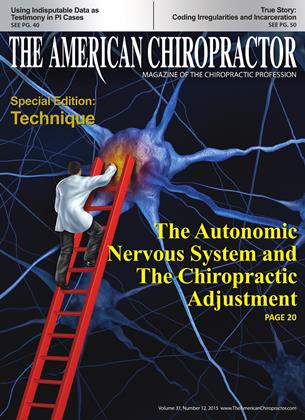The DC’s Dos and Don’ts of Social Media
REGULATORY CORNER
By Kelly R. Webb, MA
The internet is full of social media horror stories, such as an errant post that kills a career or a tweet that turns a respected professional into a social pariah. Some sort of internet-related complaint has been reported to 92% of medical licensing boards, and chiropractic boards describe a growing trend toward disciplinary problems stemming from online contact. However, online engagement is becoming a keystone to business success.
Facebook, Twitter, Linkedln, Instagram, blogs, professional forums, and dozens of other electronic tools can help you connect with others, stay informed, and grow your practice, but only if you use them correctly. They can also land you in some pretty hot water with your board, your colleagues, and your patients if you use them incorrectly. So, to help you navigate this online minefield, here are a few dos and don’ts of social media:
DO remember that your board’s advertising and marketing regulations apply to social media.
DON’T assume the social-media marketing package you just bought is compliant with your state’s regulations.
DO protect your patients. HIPAA violations can occur easily on social media. Even “hypothetical” cases can be familial' enough for patients to recognize themselves in a scenario.
DON’T post anything you wouldn’t want your patients to read.
DO be clear about your credentials, employment, and any possible conflicts of interest.
DON’T trust online security. Ashley Madison users, Target shoppers, and Sony will attest that security is only secure until it’s hacked.
DO act professionally. Even when you’re not posting in your capacity as a professional, your words and actions reflect on your practice. You may think your lion-hunting hobby is unrelated to your professional healthcare practice, but everything is related in cyberspace.
DON’T give healthcare advice over social media. The relationship between a doctor and a patient is too complex to tweet.
Finally, DO pause before you post. By taking a breath to consider your words, it can save you from experiencing a huge headache. You can even use the following Texas Instruments Ethics Quick Test as a guide:
1. Is it legal?
2. Does it comply with your values?
3. If you do it, will you feel bad?
4. How will it look in the newspaper?
None of this is to say that you should hide from social media Profession-specific forums are a great way to network and grow as a professional. Friend sites are perfect for staying in touch with friends and family. Any number of social media sites can help you grow your practice and find new patients.
Just like every aspect of y our professional life, ethics and common sense aie your best guides for playing it safe in social media.
Kelly R. Webb, MA, is a graduate of the University of Northern Colorado andformer writing instructor She has worked in chiropractic testing and regulation for nearly 15 years and is currently responsible for coordinating the PACE program, developing and maintaining the FCLB websites, andfor assisting with writing and correspondence needs of the Federation. (970) 356-3500 kwehhafclh.org
 View Full Issue
View Full Issue






